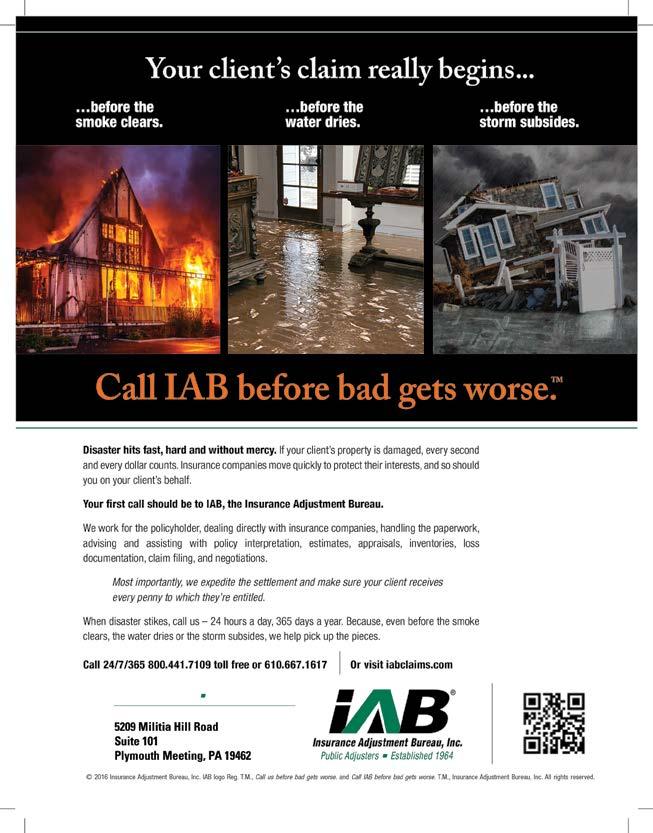










CCBA Officers
Donald B. Lynn, Jr., President
James D. Doyle, Vice President
C. Curtis Norcini, Treasure
Robert Burke, Secretary
New Matter Committee
Maria Janoski, Editor
Rami Bishay
Mark Blank, Jr.
Charles T. DeTulleo
Shannon McDonald
John McKenna
Mary Wade Myers
Sara Planthaber
Karyn L. Seace
Scott Slomowitz
Bill Wilson
CCBA Staff Greg Nardi Executive Director
Melissa Willson Communications, Events, and Marketing Manager
The Chester County Bar Association’s quarterly publication, New Matter, has been provided to Bar Association members for four decades.
A valuable aspect of CCBA’s membership, New Matter aims to provide our members with information pertaining to current issues facing the practice of law, historic legal issues, continuing legal education opportunities, Chester County Bar Association activities, programs, meetings, functions, practice tips, procedures for attorneys, and items of personal interest to our membership.
The opinions expressed in this material are for general information only and are not intended to provide specific legal or other advice or recommendations for any individuals. The placement of paid advertisements does not imply endorsement by the Chester County Bar Association.


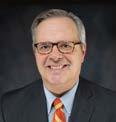 Don Lynn, Esquire President Chester County Bar Association
Don Lynn, Esquire President Chester County Bar Association
It is with great pleasure and appreciation that I write my second President’s Message for New Matter. The past few months of my year as President have been invigorating and enlightening. I am overwhelmed with gratitude and admiration for the leadership, service, and hard work of our members, our volunteer leaders, and the CCBA staff.
The committees, sections, and YLD are working together now more than ever to provide first-rate programming to a large number of attendees at each event. The CCBA is coming together as a unified organization to provide exceptional benefits and opportunities to maximize your membership, service opportunities, and our social network.
For example, the leaders of our sections and committees came together in February to put together a fantastic social event “Oh! The Places You Will Go!” Fifteen of our sections and committees set up a table with a themed drink, food, and decorations to create a fantastic social event that was an incredible amount of fun. In March, we hosted our annual St. Patrick’s Day Happy Hour with a surprise appearance by our local leprechaun to the delight of the capacity crowd. Additionally, this year’s Mock Trial Competition, organized by our YLD under the leadership of chair Ryan Jennings and chair-elect Lauren Nehra, was smooth, organized, and ultimately very successful. For the first time in recent memory, all of the volunteer spots were filled weeks in advance.
The great service and teamwork of our leaders is highlighted each spring with our Spring Bench Bar Conference. The first part of the event saw fantastic CLEs presented by Brian Quinn of Lawyers Concerned

for Lawyers and well designed, thoughtful CLEs from our participating leaders. Bill Wilson moderated a fantastic panel with updates from all of our Row Officers and another great CLE from CCBA Vice President James Doyle, Kristen Bennett, and Gordon Prince. Finally, President Judge Hall and our Bench provided a great update on all areas of practice to help keep the community abreast of everything going on. An event like this would not be possible without the coordination at the top from Conference Committee Chairs Andrea Pettine and Pat McKenna along with staff members Meredith Barr and Melissa Willson. As you know, there are many others that participated on the panels at these CLEs and assisted in the preparation of the programming and sponsorship. The great work of our staff and members along with the support of the Bench enabled this year’s event to see record attendance and sponsor participation. While the conference is a great resource for our membership, it is also a huge undertaking that would not be possible without great leadership, teamwork, and selfless service of all involved. Thank you!
I am looking forward to our charitable Bar Foundation’s annual fundraiser, The Key Gala, on May 16th at the Brandywine River Museum, in Chadds Ford. This year’s event is shaping up to be especially nice given the generosity of our supporters and sponsors, the growth of our Foundation’s programming, and this special venue. We hope to see you all there!
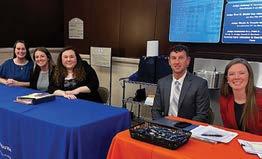
Additionally, preparations are underway for the Fall Bench Bar Conference at the Hotel Hershey from September 26-28, so please save the date!
Thank you again for all of your hard work, ideas, and support so far this year. It’s been an extraordinary start to the year, and I am thoroughly enjoying my presidency. Please contact me at any time with suggestions and questions. Thank you for choosing to be a member of the Chester County Bar Association.

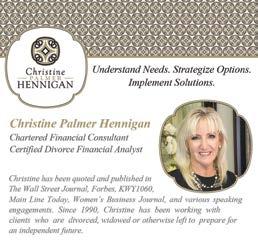



 By John McKenna, Esquire
By John McKenna, Esquire
John McKenna: I am with Judge Mincarelli right now. Judge Mincarelli: Good afternoon.
John McKenna: These are a series of questions that everyone wants to know about you. The first one is are you married?
Judge Mincarelli: I am.
John McKenna: How did you meet your spouse?
Judge Mincarelli: It was a “referral” actually. A friend of mine was working with Erica at the company that she works for and she had introduced him to one of her college friends and I guess he wanted to return the favor so he introduced me to her as a blind date twenty years ago this year. The rest is history as they say.
John McKenna: Excellent, do you have any hobbies?
Judge Mincarelli: I do. Being a dad, I try to involve myself with my children. I enjoy doing that. I do scouts with my son and I do sports with my kids; we go camping alot, fishing and I try to spend as much time as I can when I am not working or doing other things,
John McKenna: How many kids do you have?
Judge Mincarelli: I have two. My son Louis just turned 15 years old on Groundhog Day and my daughter Jessica is 13 years old.
John McKenna: What made you decide to go to law school?
Judge Mincarelli: Actually, I always wanted to be a Judge. I was working downtown in Philadelphia in between my Sophomore and Junior year of College and was doing research for an attorney out of the Prothonotary’s office down there. On my lunch hour, back before they had the criminal justice center, I used to go and watch all the trials in City Hall and I just really liked the way that the attorneys interacted and did what they did and how the Judges interacted. I knew right then that I wanted to go to law school so it was a well spent summer.
John McKenna: Where did you go to law school?
Judge Mincarelli: Temple.
John McKenna: What year did you graduate?
Judge Mincarelli: 2003.
John McKenna: When did you first come to Chester County?
Judge Mincarelli: I met my wife twenty years ago and I moved here about 16 years ago to raise our family.
John McKenna: So that was?
Judge Mincarelli: 2007 & 2008.
John McKenna: So, you were appointed Judge so how did that work?
Judge Mincarelli: There were two vacancies actually; Judge Jacqueline Cody and Judge Karen Platt went senior status before the end of their terms. There is an application process, that was about a 35-page application that I submitted. You go through various background checks, had to get an interview by a panel of attorneys. They were from all over the state. Some were from Philadelphia, some were from Pittsburgh and in between, you go through series of interviews with them. Then, if you get through all the background checks the Governor’s office contacts you. I had to go and testify in front of the Senate Judiciary Committee to be deemed qualified and then the full Senate had to vote on us and I got 98% of the full Senate’s support.
John McKenna: Congratulations on that. What were your first impressions on going to the bench?
Judge Mincarelli: It was a more difficult job than I think people realize. It’s a very satisfying job. I had been in courtrooms for over 20 years and I had ideas on what the Judge does obviously from being a litigator for all that time, but until you are actually on the bench it is difficult to really explain how difficult it is, especially when you are the person that everyone is looking to make the decisions. So, you have to have not just knowledge of the law but you have to have a certain amount of humility to understand when you don’t understand an aspect of the law. You want to make sure that you get things right. You need to be able to take a time out when you need to so you get it right.
John McKenna: What kind of cases did you preside over?
Judge Mincarelli: Judge Hall assigned me to family, criminal, juvenile and dependency.
John McKenna: What would you spend the most time in?
Judge Mincarelli: It was pretty equally distributed between my family docket and my criminal docket and then it was Judge Hall, Judge Royer and myself that did the juvenile cases when I was doing them. And then I was doing dependency with Judge Sondergaard and Judge Binder. I was kind of the backup to them so did not do them as often as some of the other assignments. But I really enjoyed all of it.
John McKenna: Coming into your courtroom, do you have any advice back then about what you would tell a lawyer?
Judge Mincarelli: I always tried to be accommodating to practitioners because I know what is like to have to be in multiple places at one time. I do not expect everyone to be there if they need to be at other places, just communicating with the other attorneys and my staff so that everyone was aware of what is going on. Just be cognizant and mindful of their time as well. I understand that things come up, so as much communication as possible I think is always a good policy. Being respectful to the other litigants. Let them speak, don’t talk over them. One of my pet peeves is interrupting your opposing counsel.
John McKenna: Now that you are in private practice, what do you find different?
Judge Mincarelli: I think the difference is that in private practice you are not as isolated as being on the bench. When you are on the bench you sort of have to work within the confines of your role and make sure that you are not interacting inappropriately with people that are maybe coming in the front of you. It can be a very isolating job. Fortunately for me, my colleagues at the time were fantastic resources and a great support system, so that’s what helped us bond. So, I will always have those bonds with them I think or hope. But as far as being out in private practice, especially in Chester County, I think that we have a fantastic Bar and I think that the attorneys are all very professional for the most part and it’s very collegial, which is a nice thing.
John McKenna: What do you find different about working here at MacElree Harvey?
Judge Mincarelli: I think that the attorneys here are fantastic and a lot of them actually appeared in front of me when I was a Judge, which is one of the reasons I was very excited about coming here to work as a practitioner and litigator. I think that they set high standards for their attorneys and I think that they give great representation and great advice to their clients so I am excited to be part of that.
Continued from page 7
John McKenna: Briefly, what’s the problem you had with transferring CLE credits? I understand it was fiasco in a certain sense.
Judge Mincarelli: I am probably one of the most educated attorneys right now because I am in the first compliance group so when I got appointed in 2022, I was in compliance group 1, I had to have all my CLEs for the year by April 30th. On July 18th, I’m getting sworn in, so I had banked a lot of CLEs and found out shortly thereafter that not only are they not good, they don’t transfer for continuing judicial education or CJEs but I had to take my full year’s complement in less than half of a year. I had to scramble to get them done. But I thought because I banked a few hours after 2023 but then when I was not elected, I had to go back to private practice, my CUEs did not transfer to CLEs. So, I am back at square one, trying to get all of my CLE's together. So, hopefully when you see me, I will be very well versed in certain aspects of the law.
John McKenna: Between today which is February 6 and April 30, how many more credits do you need?
Judge Mincarelli: l need about 8.5 more at this point.
John McKenna: OUCH!
Judge Mincarelli: So, I will be working on that. I’ll probably see you at some of the Bar Association events coming up.
John McKenna: One last thing, in terms of being in private practice, how has your personal life been any different?
Judge Mincarelli: Well, when I was on the bench a lot of the times, I spent after hours campaigning so I don’t have that now. I spend a lot more time with my family which is great. I obviously come here to fulfill a role and do my job but I don’t have the distraction of having to run for office anymore. That is one of the good things about this firm, that there is a good work-life balance and I think there are a lot of self-starters so it’s not like people have to be watching over people to get things done. I think everybody is motivated themselves. It’s been a good fit for me.
John McKenna: What are you going to be doing practice wise?
Judge Mincarelli: I’m in the litigation department, and I am hoping to develop along with Judge Nagle and with you, to develop a mediation and arbitration practice and put some of the skills that we developed over our various careers to work for litigants who maybe can benefit from our ability to take a look at the case and avoid the cost and expense of litigation.
John McKenna: Thank you for your time.


 IBy Mark Blank, Jr., Esquire
IBy Mark Blank, Jr., Esquire
n August 2023, a District of Columbia Federal Grand Jury indicted former President Trump (“Mr. Trump”) on four criminal counts arising from the steps that he allegedly took to alter the outcome of the 2020 Presidential Election. The Indictment is 45 pages with 130 paragraphs containing the factual allegations.
The counts of the Indictment are: (1) Conspiracy to defraud the United States (by attempts to overturn the 2020 election results) in violation of 18 U.S.C. Section 371; (2) Conspiracy to obstruct an official proceeding (the Congress’s certification of the electoral vote) in violation of 18 U.S.C. Section 1512(k); (3) Obstruction of and attempt to obstruct an official proceeding (the certification of the electoral vote) in violation of 18 U.S.C.
Sections 1512(c)(2), 2; and (4) Conspiracy against rights (i.e., to vote and to have votes counted), in violation of 18 U.S.C. Section 241.
Mr. Trump moved to dismiss the Indictment on various grounds, however, in particular, presidential immunity. The United States District Court for the District of Columbia denied the motion. United States of America v. Donald J. Trump (“United States v. Trump”), D.C., Dist. of Col., Criminal Action No. 23-257 (TSC), 1 December, 2023. Mr. Trump appealed. The Court of Appeals, in a 57-page opinion, affirmed. United States v. Trump, C.A. Dist. of Col. Cir., No. 23-3228, 6 February, 2024. The Supreme Court granted certiorari.
The doctrine of absolute immunity for certain government officials has been a part of American jurisprudence from time immemorial. See: Bradley v. Fisher, 80 U.S. 335 (1871) (judges), cf., Stump v. Sparkman, 435 U.S. 349 (1978); Imbler v. Pachman, 424 U.S. 409 (1976) (prosecutors); Tenney v. Brandhove, 341 U.S. 367 (1951), Bogan v. Scott-Harris, 523 U.S. 44 (1988) (legislative officials). As to Presidents of the United
States, the Supreme Court has made it manifestly clear that a former President is unqualifiedly (categorically) immune from civil liability for his “official acts,” the latter being defined as any conduct by a President “within the ‘outer parameter’ of his official responsibility.” Nixon v. Fitzgerald, 457 U.S. 731, 756 (1982).
As the Court of Appeals observed, however, the question as to whether a former President enjoys absolute immunity from criminal liability is of first impression. United States v. Trump, C.A., Dist. of Col. Cir., supra, 18. “Former President Trump’s claimed immunity would have us extend the framework for Presidential immunity to criminal cases and decide for the first time that a former President is categorically immune from federal prosecution for an act conceivably within the outer parameter of his executive responsibility.” Id.,19.
In rejecting all of Mr. Trump’s arguments, the Court of Appeals did not find it necessary to address whether or not the acts alleged in the Indictment were within or outside of the scope of his official duties as President. The court thus concluded: “Concerns of public policy, especially as illuminated by our history and the structure of our government compel the rejection of [Mr. Trump’s] claim for immunity in this case . . . We also have considered his contention that he is entitled to categorical immunity from criminal liability for any assertedly official action that he took as President - a contention that is unsupported by precedent, history or the text of the Constitution . . .” Id., 57.
The Supreme Court heard oral arguments in April.
In United States v. Nixon, 418 U.S. 683 (1974), the Court held that the President of the United States can not shield himself from producing evidence in response to a subpoena based on “executive privilege” or (at least in that case) in the name of national security. Four of the nine Justices in 1974 were Nixon appointees. Many observers, including a political science professor at a local college, were of the view that, given its judicial composition, the Court would find in favor of President Nixon. I disagreed, and predicted that the Justices would unanimously hold in favor of the Government.
I was right then, and I think that I am correct now. I will not place bets, but based on my perusal of the well written, scholarly and legalistic opinion of the Court of Appeals, I believe that the SCOTUS will find for the Government. Although there may be some concurrences and, perhaps even a plurality, I surmise that the decision will be unanimous.
In United States v. Nixon, supra, Justice Rehnquist took no part in the consideration of the case. Query: Will Justice Thomas participate here? I would not be shocked if he did not; however, his participation would not be a surprise to me either.




“Everybody can be great because everybody can serve.”
– Martin Luther King, Jr.
 IBy Greg Nardi CCBA Executive Director
IBy Greg Nardi CCBA Executive Director
’ve always been surrounded by examples of selfless service. I think that helps explain why I love working in our Bar Association. My mother was a nurse, and my father was highly involved in our church and as an adult leader in Scouting. When I was in elementary school, I recall a young Vietnamese family living with us for a short time. I did not understand it at the time, but my parents temporarily took in this family of refugees while a local church group prepared an apartment for them. I later learned that my grandparents took in immigrant families from England on many occasions after World War II to help them get settled in the United States. My grandmother was herself an immigrant after
World War II and had local families in Queens, NY (her new husband’s family who were immigrants themselves) initially take care of her. So, with all of this in mind, I find myself continuously inspired by the dedicated members who embody the spirit of selfless service. Our bar association thrives on the commitment and leadership of volunteers who tirelessly work to help other members, enhance the legal profession, and serve our community.
At the heart of our association lies the essence of leadership, not in the traditional sense of authority and command, but in the act of selfless service. This service builds trust. Trust between members and trust between the legal community and the greater community in Chester County. It is a leadership that goes beyond titles and positions, where individuals step forward not for personal gain, but for the collective betterment of those around them.
At the core of our understanding of leadership lies the recognition that it is not merely about holding positions of authority or making decisions; rather, it is a dynamic process of influence that drives positive change and fosters growth. True leaders are not defined by titles, but by their ability to inspire and empower others to achieve shared goals. They lead not for personal gain, but to uplift and elevate the organization and those within it. In this sense, leadership is not just about accomplishing tasks; it is about creating a culture of collaboration and continuous improvement. It is about encouraging the talents and potential of others, enabling them to excel and contribute meaningfully to the collective success of the organization. As we honor the contributions of our volunteer leaders, let us recognize and celebrate the profound impact they have had, not only in accomplishing our association’s goals but also in bettering the lives of our members and strengthening our legal community.
One of the most remarkable aspects of our association is the multitude of volunteer leaders who contribute their time, energy, and expertise to organize and execute exceptional programs for our members. These volunteers, both long-time supporters and newly appointed members, exemplify this idea of service above self. To our long-time volunteers, whose dedication has shaped our association’s culture and brand, I extend my deepest gratitude. These individuals have selflessly devoted countless hours to mentorship, professional development, and community outreach. Karyn Seace and Janet Colliton put together great programming for our Elder Law Section every single month without fail. Roseann Chiple and the Naturalization Committee put together organized, solemn, and inspirational Naturalization Ceremonies three times per year to welcome new U.S. citizens to our great country. They organize a lot of fanfare for the new citizens but ask for none in return. Rick Meanix has been the lead editor for the judicial opinions in our weekly Law Reporter publication for many years for little recognition or compensation. Maria Janoski and the New Matter committee write, interview, edit, and otherwise coordinate and prepare articles for our quarterly award-winning magazine New Matter. These are just a few examples of the many great leaders we have. The commitment of these and many others serves as a beacon of inspiration for us all, reminding us of the profound impact that sustained dedication can have on our profession and society.
Equally deserving of recognition are the new leaders who answered the call for assistance when the need arose. Their willingness to step into unfamiliar roles and embrace the challenges of leadership speaks volumes about their character and commitment to our association’s mission. Recent additions to the association’s leadership include Jamie Goncharoff, one of our Past Presidents, who stepped forward to lead our Veteran Affairs Committee. Kristen Wetzel Ladd, Bob Lohr, and John Gagliardi have recently taken the reins of our Bankruptcy and Creditors Rights Section. They are an outstanding example of cooperation and collaboration to bring great programming to our members. Tom Wilcox volunteered to lead our Diversity Committee and help lead that group to start organizing some great programming for the Association and our community. The newly named Criminal Justice Section is now led by Grant Bloomdahl, Kelly Jurs, and Mary Lawrence – another successful collaboration. With so many of our members in solo and small firms, it is fantastic to have the experience of Lisa Hall and Bill Wilson at the helm; two Past Presidents who have themselves built successful solo practices. The fresh perspectives of all of these leaders and their innovative ideas invigorate our programs and ensure that we remain dynamic and responsive to the evolving needs of our members.
The selflessness of all our leaders fosters a sense of camaraderie among our members, creating a community where collaboration thrives, and individuals are empowered. As we continue to navigate the challenges and business of the legal profession, we must never lose sight of the invaluable role that volunteer leaders play in shaping the future of the CCBA and the legal profession as a whole. Their dedication, passion, and commitment to service serve as a testament to the strength of our legal community.
I invite all members of the Chester County Bar Association to join me in expressing our deepest appreciation to our volunteer leaders. Your selfless service makes our association better in ways that words cannot fully capture, and for that, we are grateful. Together, let us continue to uphold the principles of leadership, selflessness, and service as we continue to shape a brighter future for our profession and our community.
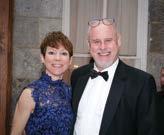


 By Maria Janoski, Esq.
By Maria Janoski, Esq.
The CCBA rocked Loch Aerie Mansion in February at the annual President’s Dinner celebrating our outgoing president, Brian L. Nagle, Esq. The dinner was a fitting bookend to a presidency that began with a poignant gavel pass straight out of a Hollywood movie script. For the approximately one reader who may not know what the gavel pass is, it is an event at the annual meeting during which all of the CCBA’s past presidents line up chronologically in order of their service and pass the gavel, one to the next, until it reaches the new president. In 2023, the gavel pass started with The Honorable Ronald C. Nagle, Brian’s father and the 1987 president, and ended with Brian. It foretold a great year for the CCBA under Brian’s leadership.
The dinner was well attended. There was an enjoyable cocktail hour featuring a signature drink in honor
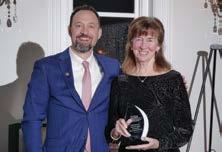
of Brian. This was followed by a delicious dinner, a humorous video about Brian, and just the right number of speeches.
The evening also saw six of our members receive well deserved awards. John Fiorillo, Esq., received the President’s Award. Mark Blank, Jr., Esq., received the Honorable Juan R. Sánchez Pro Bono Award. Phillip A. Simon, Esq., received the John F. McKenna Access to Justice Award. Donald F. Kohler, Esq., received the Chester County Bar Foundation Key Award. The Honorable Jacqueline C. Cody received the Board of Directors Award, and Michelle Bernado-Rudy received the Chester County Bar Foundation Presidents Award.
For those who attended, it was a classy and memorable night. For those who couldn’t make it, that was the recap.



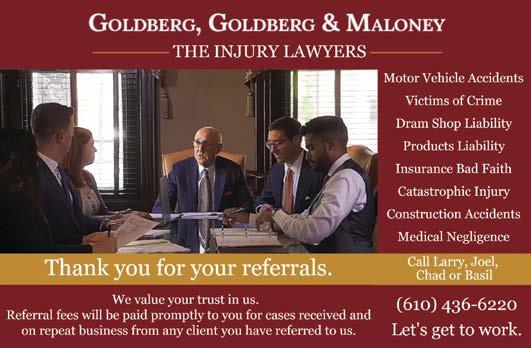
Congratulations to the following attorneys who have been named to the 2024 Class of VISTA Millennial Superstars for Chester County:
AMANDA M.V. GRANT, Esq., MICHAEL ROVITO, Esq., and LAUREN NEHRA, Esq.


WISLER PEARLSTINE, LLP is pleased to welcome CARLA MARINO, a respected Chester County attorney, to its Malvern office as a partner in the firm’s Family Law practice.
Villanova University’s Public Interest Fellowship Program (PIFP) is honoring Gawthrop Greenwood attorney JOHN RAFFERTY with the Public Interest Distinguished Service Award, for his steadfast work to advance causes in the public interest.

CURTIS L. ‘CURT’ SEBASTIAN has joined LAMB MCERLANE’S Municipal Law department. Curt’s practice includes a wide variety of municipal, regulatory, land use, and environmental matters.

JOELLE T. SHANESY has joined LAMB MCERLANE in its Family Law department. Joelle will assist clients with divorce matters, custody, child support, spousal support and alimony, adoption, and protection from abuse.



“I have had the pleasure of working with LRS for several years now and can confidently say that their team is exceptional. They are easy to work with and always willing to go the extra mile to meet our needs and those of our clients. We highly recommend LRS for anyone looking for a reliable and supportive referral program. In fact, we have seen a steady return on investment since we first signed up with them. If you're looking to partner with a referral source, LRS is the way to go!”
-Holly Sheridan, Esquire Sheridan Lawyers
 FBy Steven L. Sugarman, Esq.
FBy Steven L. Sugarman, Esq.
or many years, service animals and emotional support animals (“ESAs”) have been the subject of controversies and disputes between unit owners and community associations. Under the Federal Fair Housing Act, as amended, and guidelines promulgated by the Department of Housing and Urban Development (“HUD”), community associations have been required to make reasonable accommodations for service animals and ESAs provided that certain criteria are satisfied. Now, in its FHEO Notice: FHEO-2020-01 issued in January of 2020, HUD draws a distinction between animals commonly kept in households (i.e., dogs, cats, small birds, rabbits, hamsters, gerbils, other rodents, fish, and turtles) and “unique” animals (reptiles other than turtles, barnyard animals, monkeys, kangaroos, and other non-domesticated animals). HUD notes that animals commonly kept in households serve a pleasure purpose, not a commercial purpose.
Under HUD’s guidelines, if an ESA is an animal commonly kept in a household, a reasonable accommodation should be granted as long as information that confirms the disability‐related need for the particular ESA has been provided to a community association. However, if an ESA is a “unique” animal, the requesting party has the substantial burden of demonstrating the disability-related need for the particular ESA. HUD encourages requesting parties to gather reliable documentation from a health care professional, confirming the disability‐related need for the particular ESA, because a lack of reliable documentation may constitute grounds for a community association to deny a requested accommodation.
Reliable documentation from a health care professional should include the date of the last consultation with the patient; any unique circumstances justifying the patient’s need for the particular ESA (if already owned) or a type of ESA; and whether the health care professional has information about the particular ESA, or whether the health care professional specifically recommends a type of ESA.


In summary, it is not so much the uniqueness of an animal that is dispositive; rather, it is how well the requesting party is able to document and demonstrate the circumstances justifying the need for a unique emotional support animal. As a general rule, reasonable accommodations may be necessary when:
1. A unique ESA is individually trained to take a specific action or perform a specific task that cannot be performed by a dog.
2. Information from a health care professional confirms that allergies prevent the requesting party from using a dog, or, without a unique ESA, the symptoms or effects of the requesting party’s disability will be significantly increased.
3. The requesting party seeks to keep a unique ESA outdoors at a house with a fenced yard, where the unique ESA can be appropriately maintained.
However, HUD makes it clear that a community association may deny a requested accommodation if a unique ESA poses a direct threat that cannot be eliminated or reduced to an acceptable level through actions taken to maintain or control the unique ESA, such as keeping the unique ESA in a secure enclosure. As can be seen, determining whether a reasonable accommodation should be granted will be greatly dependent upon the specific facts and evidence adduced by the parties. As of now, there is a paucity of cases decided nationwide under HUD’s relatively new Notice, but that is likely to change.












Since we opened our doors in 2019, we have experienced consistent growth due to your confidence in us for the care of your patients. For that, we profoundly thank you.
Our clients come from all walks of life and many from miles away. But what they all have in common is a beloved pet with oral cancer or significant dental and anesthetic needs. We are honored to help, and our consistent 5-star online reviews show our commitment to concierge-level care and service.
We’d like to introduce you to the VDS Chadds Ford clinical team, including our newest members: Dr. Kelly Saverino, Dr Becca Feuer, and Dr Melanie Jarrett.
We welcome your call should you wish to consult about a challenging case, or, if you make a referral for care, please know we promise your clients and patients an exceptional experience.
VDS is the only referral practice in the nation dedicated to

board-certified veterinary dentist and a board-certified veterinary anesthesiologist are
comfortable experience… and the best possible outcome.
Beginning January 22, 2024
Dr. Herrmann will see patients at our Chadds Ford location Monday through Thursday.
John Lewis, VMD DAVDC, FF-OMFS
Every law firm needs clients—without them, the well of revenue will inevitably run dry. However, generating new business is easier said than done. More than half of surveyed lawyers say acquiring new clients is their biggest challenge. Retaining them can also be difficult in today’s fast-paced legal landscape.
Fortunately, there are simple ways to provide an exceptional client experience, appeal to more prospects, and increase referrals. In this article, we’ll discuss what recent research reveals about client expectations and the four strategies your firm can pursue to exceed those expectations for greater success. Let’s dive in.
The Legal Industry Report from LawPay and MyCase
(our sister company specializing in legal practice management software) found that 84% of surveyed legal professionals now accept credit cards and ACH payments from clients via online payment tools.
Even if you still have some clients who want to pay the old-fashioned way, simply offering the additional option to pay online can improve client relations. According to Fiserv’s Billing House Survey, 71% of respondents say being offered multiple ways to pay increases satisfaction. 79% of consumers expect local service providers to offer the same payment options as larger national companies.
Accepting online payments exceeds client expectations, often improves payment cycles, and helps increase collection rates.
Consumers today can retrieve information on almost any subject—nearly as fast as they can type. As such, most consumers will turn to the Internet when seeking legal advice or representation. In order to remain competitive, your firm needs a website or, at the very least, a web presence for marketing your practice.
Below are a few web tips that can help you sell your practice and prompt potential clients to contact you.
1. Make sure that your website’s navigation is userfriendly so potential clients can easily find the information they need.
2. Alongside your expertise, take some time to discuss your legal process. Let clients know what they can expect from you and what makes your firm different from competitors.
3. Showcase your accomplishments, wins, and why people should pick your practice. This is also a great opportunity to include client testimonials to put some gravitas behind your claims.
4. Include a professional picture of yourself and your team—or, even better, a video. This allows your potential clients to put a face to the person who will help them through an important (and often stressful) time in their lives.
Failing to respond within a certain window (typically within 24 hours) may lose you a client. Plus, most clients are reaching out to you at a critical or stressful time. They need legal help as soon as they can get it—if you don’t respond to them, another firm will.
Legal technology like case management software allows you to automate and streamline client communication in-house for a more consistent, personalized experience. Case management software can also allow you to reach clients via their preferred methods, such as a client communication portal or text messaging.
Cultivating an exceptional client experience leads to client loyalty, word-of-mouth referrals, and, ultimately, revenue growth.
Start off by setting clear expectations from the very first meeting. This may include:
• The process your firm takes with cases like theirs, such as the next steps following the initial consultation
• The estimated timeline for their case
• How you plan to bill their case, including your rate information and when bills will be due, as well as how to pay
That last point is particularly important. The fastest way to create confusion among clients is through billing and payment misunderstandings. Utilizing a reliable payment platform, such as LawPay, enables you to automate invoice sends and reminders—helping to ensure that payment doesn’t become an issue between your firm and the client.
Track time, invoice, and get paid— anytime, anywhere
LawPay’s end-to-end billing and payments platform helps legal professionals keep their firm at their fingertips. Track time and invoice at court, and get paid (39% faster) while you sleep.
Designed specifically for law firms and recommended by the American Bar Association, the LawPay payments platform ensures IOLTA compliance and helps elevate the client experience through simple, flexible, and convenient payment options.
Book a LawPay demo today and learn how it can help you run your firm efficiently and free up time to focus on practicing law—anytime, anywhere.

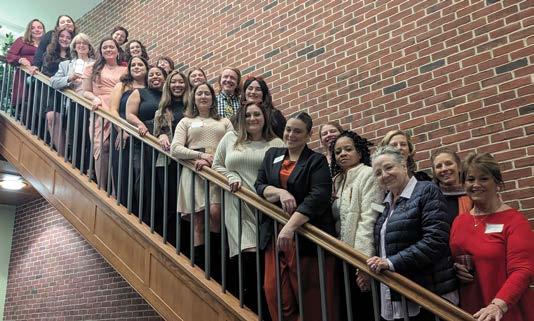

he Crime Victims’ Center of Chester County, Inc. held its First Annual Show the Love Celebration at the Chester County History Center on February 8th. CVC staff and supporters celebrated by hearing from department supervisors, Stephanie Rilett, Counseling Supervisor, Rachel Cowgill, Direct Services Supervisor and Naomi DeVine, Prevention and Education Supervisor, on the impact of donations on their work. In addition, CVC CEO Christine Zaccarelli and COO Ashley Shea recognized staff for their length of service and joined the CVC Board of Directors in presenting the 2023 Peggy Gusz Victim Advocacy Award, the John J. Crane Child Victim Advocacy Award and the Inaugural Brooke Hedderick CARES Award. The evening was one of gratitude and celebration of the entire team at CVC, volunteers, and donors.
The Peggy Gusz Award was presented to Corporal Stephan Walker of the Malvern Police Department. The Peggy Gusz Award was created in 2018 to recognize Margaret “Peggy” Gusz’s longtime victim advocacy efforts since CVC was formed in 1973. Through her efforts, she helped give a voice to victims when their needs
went unmet and helped change the attitudes of law enforcement professionals, medical professionals and the legal system toward victims.
Corporal Walker was chosen by CVC’s Board of Directors for his work in supporting all victims, but specifically those of sexual assault, abuse and harassment. As shared by a CVC Advocate after one particular case, “Corporal Walker was so kind and trauma-informed during the interview. He consistently reminded her that this wasn’t her fault. He believed her.”
After the event, Corporal Walker said, “I am very honored to receive the Peggy Gusz Victim Advocacy Award. The Crime Victims’ Center of Chester County is so very important to Law Enforcement. I am very thankful and honored to work with the Crime Victims’ Center, for the survivors! “
The John J. Crane Award was presented to Lieutenant Janis Pickell of the Chester County Sheriff’s Office. The John J. Crane Award for Child Victim Advocacy was created by CVC in 1998, as tribute to the late Chester County prosecutor, a nationally recognized advocate for crime victims – especially children.
Lt. Pickell was chosen by CVC’s Board of Directors for her work as the handler of Marley, the comfort dog at the Chester County Justice Center. She was nominated by two CVC staff members and they shared that Janis does a great job building rapport with clients with her easy demeanor and comforting presence with them along with managing the comfort dog that makes a victim’s difficult experience in having to testify a little bit easier. Janis has a wonderful ability to put the
clients at ease both with Marley and through her easy and kind demeanor. We are lucky to be able to work alongside her to help our clients.
Lt. Pickell said of receiving the award, “I am honored to work in collaboration with the amazing team of people from the Crime Victims’ Center. The opportunity to partner with other agencies in an effort to seek justice and protection for victims makes it all worth it!” And Marley was also honored to be recognized and said, “ It’s a woof job, but the smiles that I see make me wag my tail with joy!”
The Inaugural Brooke Hedderick CARES Award was presented to Erica Perloff, CVC’s RASA Coordinator. The Brooke Hedderick CARES Award was created in 2023 in loving memory of CVC’s longtime VP of Operations Brooke Hedderick. It is awarded annually to a CVC staff member for extraordinary dedication to CVC and the community, exemplifying everything that Brooke meant to CVC and her clients.
Mrs. Perloff was chosen by CVC’s Board of Directors for her dedication to CVC and her compassion for her clients and co-workers. She was nominated by five CVC staff members and said one nominator, “She seems to exemplify the spirit of generosity and dedication, the sort of volunteer and unselfish mentality that I was discovering had long been a norm at CVC.” Said another, “Erica is the perfect example of a dedicated advocate that goes above and beyond for not only clients but also her coworkers. She is professional and patient with clients and an inspiration to all advocates.”

In accepting the Award, Mrs. Perloff shared, “It is a great personal honor to receive an award bearing Brooke Hedderick’s name. In my twenty-two years of working at CVC Brooke was the cornerstone of the agency and the most dedicated and compassionate leader, providing supportive supervision. She was always there for us, the advocates, as well as the victims. She served the Chester County Citizens loyally, throughout her extensive career.”
CVC’s Counseling Supervisor Stephanie Rilett truly captured the sentiment of the evening when she said, “Our counseling team thanks you for providing the funding to be able to perform their calling. Without supporters like you we would not be able to provide the quality level of services to the people of Chester County. There would be no one to help victims of crime make sense of the chaos.”
The Crime Victims’ Center of Chester County, Inc. (CVC) is a nonprofit agency providing free, immediate, and confidential crisis response and compassionate support to children and adults impacted by sexual violence and all other crime. We provide assistance through counseling, advocacy, resources, and education. The Center fosters community awareness and understanding through its comprehensive outreach and prevention programs. To learn more, visit www.cvcofcc.org.
• Judge, Court of Judicial Discipline
• Former Chairman, Judicial Conduct Board of Pennsylvania
• Former Chairman, Disciplinary Board of the Supreme Court of Pennsylvania
• Former Chairman, Continuing Legal Education Board of the Supreme Court of Pennsylvania
• Former Chairman, Supreme Court of Pennsylvania Interest on Lawyers Trust Account Board
• Former Federal Prosecutor
• Selected by his peers as one of the top 100 Super Lawyers in PA and the top 100 Super Lawyers in Philadelphia
• Named by his peers as Best Lawyers in America 2022 and 2015 Philadelphia “Lawyer of the Year” Ethics and Professional Responsibility Law and Legal Malpractice Law
Market Street, East
(215) 751-2863

 VBy John R. Embick, Esquire John R. Embick, PLLC Chair of the CCBA Environmental Law Section
VBy John R. Embick, Esquire John R. Embick, PLLC Chair of the CCBA Environmental Law Section
arious news media recently reported on the sentencing of FTX Trading, Ltd. (“FTX”) founder Sam Bankman-Fried, who was convicted in 2023 for orchestrating a fraud on thousands of customers, investors and banks in connection with the failure of FTX (a company that operated a market for buying, selling, and depositing digital currency and related assets). A related business was Alameda Research, a hedge fund which bought and sold cryptocurrency investments. Mr. Bankman-Fried was convicted of various fraudulent acts which ultimately resulted in customer losses of $8 billion; investor losses of $1.7 billion; and lender losses of $1.3 billion.
According to Oxford Languages, Bitcoin is a type of digital currency (or virtual currency, virtual money, or cryptocurrency) in which a record of transactions is maintained and new units of currency are generated by the computational solution of mathematical problems, and which cryptocurrency operates independently of a central bank regulation. Perhaps someday I will understand what this is and how it works.
Article 1, Section 27 of the Pennsylvania Constitution is also known as the Environmental Rights Amendment, and guarantees the people of the Keystone State the right to clean air, pure water and the preservation of the natural, scenic, historic and esthetic values of the environment.
So, what is the connection between Bitcoin and the ERA? In Pennsylvania, a series of related companies are involved in the business of validating, transacting and creating Bitcoin, and collectively are referred to here as Stronghold. A Stronghold entity owns and operates the Panther Creek Electric Generating Facility located near the town of Jim Thorpe in Carbon County. The Panther Creek Plant is a circulating fluidized bed coal mining waste reclamation and power generation facility with capacity of about 80 MW.
Stronghold also owns a similar electric generating facility known as the Scrubgrass Plant located in Scrubgrass Township, Venango County, Pa. The primary fuel sources for the Panther Creek Plant are waste coal and waste tires. Up to 15% of the fuel needed to operate the Panther Creek Plant is “tire-derived fuel.” On average, tires contain more energy per pound than an equivalent amount of coal. A number of state permits are needed to operate such a plant, including a state air quality permit. The plant emits particulate matter, sulfur dioxide, nitrogen oxide, carbon dioxide, and mercury, in addition to other pollutants. Interestingly, the Stronghold power

plants received $20 million in tax credits from the Commonwealth in 2023.
The Panther Creek Plant generates electricity for Stronghold’s Bitcoin creation, validation and transaction operations, which are referred to as “mining” in the cryptocurrency business. The Bitcoin mining process reportedly uses enormous amounts of energy for computing power and electronic equipment cooling, and generates significant amounts of electronic equipment waste. Stronghold acquired the Panther Creek Plant in 2021 and significantly increased the output of the plant (as well as the emission of air pollutants and the generation of coal ash), in order to provide power for the Bitcoin mining process.
The Panther Creek Plant is connected to the Pennsylvania-New Jersey-Maryland Interconnection (“PJM”), or electric grid, and Stronghold alleges that the plant could provide power to the PJM grid if necessary. Opponents claim that that rarely happens, and more often the Stronghold operation purchases from the PJM grid when prices are low, thereby increasing demand and increasing prices for local residents and electricity consumers.
So, the primary fuels for this electric generating plant are fossil fuels, and the plant is using or reclaiming waste materials in order to generate electricity. There are thousands of tons of waste coal piles in Pennsylvania, and especially in Schuylkill and Carbon Counties. Remember that in Pennsylvania history there was a time in the 1800s when “coal was king,” and many homes and businesses used coal for heating, manufacturing, transportation and other energy needs. The extraction and processing of coal produced thousands of tons of waste products containing anthracite and bituminous coal, which in many cases were abandoned in large waste piles. This coal waste material causes many environmental issues. The Commonwealth of Pennsylvania is also home to many waste tire storage and disposal sites, which also create environmental problems (e.g., a waste tire pile caught fire in Philadelphia’s Port Richmond section in 1996 and damaged Interstate Route 95). So, viewed in one way, the Panther Creek Plant is providing beneficial services of environmental remediation and cleanup. However, in doing so, the Panther Creek Plant also emits air contaminants, some of them allegedly hazardous.
Opponents of the Panther Creek Plant recently filed suit on March 25, 2024, against Stronghold, PaDEP and the PaPUC (and others) in Philadelphia County Court of Common Pleas. Some of the claims arise from Art. 1, Sec. 27 of the Pa Constitution. Plaintiffs
claim that: (1) the Commonwealth violated its constitutional fiduciary duty by providing incentives in the form of tax credits to an enterprise that is causing pollution and high energy demands for very little public benefit; (2) the Commonwealth failed to regulate the cryptocurrency mining industry and did not prevent harm to public natural resources; (3) the Stronghold operations have created a public nuisance; (4) the Stronghold operations have created a private nuisance; (5) Stronghold’s operations and creation of digital assets have resulted in a form of products liability (Stronghold’s method of acquisition of digital assets is defective, is inherently dangerous, and causes harm); and (6) Stronghold’s operations have caused harm and are negligent (Stronghold owes a duty to residents to refrain from causing harm and the cryptocurrency mining operation causes harm through emission of pollutants). Interestingly, no common law claim of trespass was included.
According to Investopedia, Bitcoin was invented in 2009, and was designed to provide a form of money that was outside the control of any one person, group or entity, thus removing the need for third party involvement in financial transactions. However, Bitcoin’s current, huge appetite for energy and the resulting pollution is likely an unintended consequence of the development of this form of money. I may be wrong, but I wouldn’t bet one Satoshi on its long-term viability.
In recent years, there has been a growing recognition of the importance of employee health and wellbeing in the workplace. While physical health has traditionally been the focus of employee health insurance, mental health has emerged as an equally vital aspect of overall well-being. In this article, we will discuss the relevance of mental health coverage in employee health insurance, highlighting its significance for employees and employers alike.
Mental health problems, such as depression, anxiety, and stress-related disorders, have become increasingly common in the workplace. According to a study in the World Health Organization (WHO), depression and anxiety alone cost the global economy an estimated $1 trillion per year in lost productivity. This statistic serves to bolster the need for employers to assure adequate mental health coverage is in their employee health insurance plans.
Providing mental health coverage as part of employee health insurance can significantly enhance the overall well-being of employees. Mental health issues can affect an individual’s ability to function optimally in the workplace, leading to decreased productivity, increased absenteeism, and higher turnover rates. By offering comprehensive mental health coverage, employers can help address these challenges and promote a healthier and more engaged workforce.
One of the barriers to seeking mental health treatment is the persistent stigma associated with mental illness. Including mental health coverage in employee health insurance plans can help reduce this stigma by normalizing the discussion around mental health and

encouraging employees to seek the care they need. Additionally, by providing coverage, employers can ensure that employees have access to a range of mental health services, including therapy, counseling, and psychiatric consultations.
Investing in mental health coverage can yield significant returns for employers. Employees who have access to mental health support through their health insurance tend to be more productive, have higher job satisfaction, and are less likely to take sick leave. By addressing mental health concerns proactively, employers can create a positive work environment that fosters employee well-being and enhances overall productivity and performance.
Although the inclusion of mental health coverage in employee health insurance plans may require an initial investment, it can prove cost-effective in the long run. By addressing mental health issues early on, employers can prevent more severe problems from developing and minimize the associated costs, such as absenteeism, reduced productivity, and increased healthcare utilization. Furthermore, healthier and happier employees are more likely to remain with the organization, reducing turnover and the expenses associated with recruitment and training.
The Chester County Bar Association offers its members access to My Benefit Advisor as a solution for employee benefits, including voluntary offerings. For more information about My Benefit Advisor, visit our website at ccba.mybenefitadvisor.com or contact Marlon Richardson at (215) 790-3640.











Where do you live?
Kennett Township.
What was your first job?
Wall Street Messenger.
What word best describes you? Dedicated.
Where would we find you on a Saturday afternoon? Around the Kennett area.
What is your favorite way to spend your free time? Activities with family and my dog.

What is your greatest extravagance?
My Golden Retriever Rosie.

nschenker@chesco.org
What is your favorite vacation destination?
Alaska.

What is your favorite food? Anything Asian or Asian Fusion.

Who is the person you are most interested in meeting?
Jon Stewart .
What was the last book you read?
Hero by Thomas Perry.

What is your favorite TV Show? Shetland.

What goals do you still have that you have not achieved yet? To be a better photographer.
What is a little-known fact about you? I spent my first six years of law practice in the mountains of southwestern Virginia (near east Tennessee and Kentucky).
What is something people would be surprised to hear about you?
I was a nationally ranked fencer at the University of Virginia and organized and coached one of the first Women’s varsity teams when the school became coeducational.

What is your favorite website? CNN.

What would you be if you were not a lawyer? College Professor.
What is your favorite thing about the bar association? The outreach to young attorneys (which I clearly am not).




